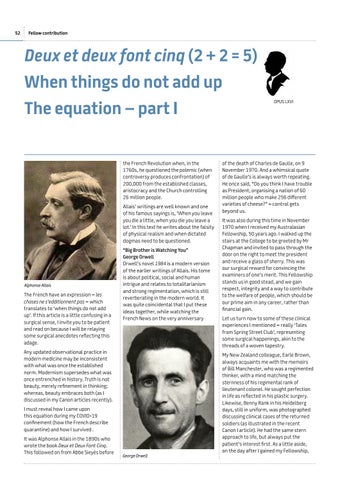52
Fellow contribution
Deux et deux font cinq (2 + 2 = 5) When things do not add up The equation – part I the French Revolution when, in the 1760s, he questioned the polemic (when controversy produces confrontation) of 200,000 from the established classes, aristocracy and the Church controlling 26 million people. Allais’ writings are well known and one of his famous sayings is, ‘When you leave you die a little, when you die you leave a lot.’ In this text he writes about the falsity of physical realism and when dictated dogmas need to be questioned.
Alphonse Allais
The French have an expression – les choses ne s’edditionnent pas – which translates to ‘when things do not add up’. If this article is a little confusing in a surgical sense, I invite you to be patient and read on because I will be relaying some surgical anecdotes reflecting this adage.
“Big Brother is Watching You” George Orwell Orwell’s novel 1984 is a modern version of the earlier writings of Allais. His tome is about political, social and human intrigue and relates to totalitarianism and strong regimentation, which is still reverberating in the modern world. It was quite coincidental that I put these ideas together, while watching the French News on the very anniversary
Any updated observational practice in modern medicine may be inconsistent with what was once the established norm. Modernism supersedes what was once entrenched in history. Truth is not beauty, merely refinement in thinking; whereas, beauty embraces both (as I discussed in my Canon articles recently). I must reveal how I came upon this equation during my COVID-19 confinement (how the French describe quarantine) and how I survived . It was Alphonse Allais in the 1890s who wrote the book Deux et Deux Font Cinq. This followed on from Abbe Sieyès before
George Orwell
OPUS LXVI
of the death of Charles de Gaulle, on 9 November 1970. And a whimsical quote of de Gaulle’s is always worth repeating. He once said, “Do you think I have trouble as President, organising a nation of 60 million people who make 256 different varieties of cheese?” – control gets beyond us. It was also during this time in November 1970 when I received my Australasian Fellowship, 50 years ago. I walked up the stairs at the College to be greeted by Mr Chapman and invited to pass through the door on the right to meet the president and receive a glass of sherry. This was our surgical reward for convincing the examiners of one’s merit. This Fellowship stands us in good stead, and we gain respect, integrity and a way to contribute to the welfare of people, which should be our prime aim in any career, rather than financial gain. Let us turn now to some of these clinical experiences I mentioned – really ‘Tales from Spring Street Club’, representing some surgical happenings, akin to the threads of a woven tapestry. My New Zealand colleague, Earle Brown, always acquaints me with the memoirs of Bill Manchester, who was a regimented thinker, with a mind matching the sternness of his regimental rank of lieutenant colonel. He sought perfection in life as reflected in his plastic surgery. Likewise, Benny Rank in his Heidelberg days, still in uniform, was photographed discussing clinical cases of the returned soldiers (as illustrated in the recent Canon I article). He had the same stern approach to life, but always put the patient’s interest first. As a little aside, on the day after I gained my Fellowship,
